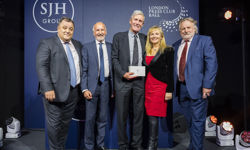
It started, like all breaking stories, with unsubstantiated reports. There was talk of a loud bang at Manchester Arena. Minute by minute, the scale grew. It was definitely an explosion. There had been fatalities. At first, the figure was put at two. Then came the moment that stunned the newsroom. Lee Swettenham, deputy digital development editor, looked up from his screen. “Nineteen dead.”
At that moment, the Manchester Evening News journalists knew they were in the middle of the worst terror attack in Britain since the London bombings of 2005.
It was the biggest story a regional newspaper had covered since social media and digital publishing became standard tools. Editor Rob Irvine and his staff followed their journalistic instincts and training and what followed was a masterclass for journalists on how to respond if, God forbid, they are faced with a story of this magnitude. The MEN not only covered the event in intense detail but its tone and leadership placed it right in the centre of the Manchester community. Here are some of the lessons learnt.
Gathering information
Traditional sources are the most reliable – the police, hospitals, fire service remain the first ports of call. They have other priorities – so expect communication to be less than perfect. Irvine says Greater Manchester Police’s updates were considered and timely. "The police did a great job in keeping the public updated and seeking their support, in terms of calming nerves and re-assuring everyone. They also cared for the welfare of affected families while making sure we were getting some information so we could pay proper tribute."
Journalism, even in these digital days, is not an office-bound job. Seeing things and talking to people face-to-face remains crucial. Within minutes, the paper had people live blogging from the Arena and reporters at hospitals.
Social media is where the first-hand accounts, the videos, the human stories are found. The staff scoured Facebook and every search imaginable was set up on TweetDeck. Social media was teeming with people saying what they had seen and looking for loved ones. But verification is a big issue and regional papers need to be the trusted source. Irvine says: “Some weird and frankly horrible people saw fit to publish on social media fake or entirely unrelated images of missing people. I saw these appear on some reputable news websites. Some would disappear shortly after but what damage had been done in the time they had generated an audience spike?” At 1.21am Irvine tweeted: “We will be updating our reports through the night and we are verifying every piece of information with great care before we publish.” It was a great move. Verification – and good taste – is vital.
Publishing in print and online
Our job as journalists is to give facts and share insight. In this respect, the goals of print and digital are identical. But there are practical differences.
Setting up a print plan early is important because it involves those outside of the newsroom - press operators, wholesalers, advertisers. The MEN cleared the first nine pages for the first edition. The run for the second edition, normally printed in the morning for home delivery, was upped so it could go into shops. All the adverts were cleared, giving 34 pages including a front-page wrap. Whereas the print deadlines give journalists a window, online is a relentless task that needs to be fed 24/7. The MEN used Twitter and Facebook to take people to the constantly updated website and app. Huge numbers from across the globe made the MEN their first call. The other key difference between print and digital is video. Irvine says: “Whether it is packages, live feeds on Facebook, or third-party content, much of it from social media. This is a huge part of what we do now. It has changed the way we approach news.”
Staffing
Regional newspapers no longer have newsrooms stuffed full of journalists at the ready, just in case the big story breaks. Of course, when it happens, everyone comes in, day off or not. No journalist wants to be watching it on TV. Some staff worked from home then headed to the office. Irvine says: "It would be wrong to single out anyone from the 28 journalists who worked that night and through into the next day. And the whole team made a huge contribution in the days that followed. You need the story-getters, the creators, you need people with empathy and strength. We have this in spades and I have been humbled but not surprised by the way my team has gone about this task. But in terms of the skills of a modern newsroom, I am very glad to have social media experts, videographers and those with a fantastic grasp of search engine optimisation."
Of course, 28 people aren't enough to cover a story of this size. They worked through the night with endless coffee but this story wasn’t going away and something had to give. It is the editor's job to ensure people get breaks, that they stay sharp for the long haul. The MEN’s masterplan was to call in reinforcements. Reporters, photographers and videographers from across Trinity Mirror were seconded and put up in hotels. Irvine says: "They have been amazing, they just got on with the job like they had worked here for years. We have been bowled over by the talent we have seen."
Planning
It can be easy when handling a story of this magnitude to slip into reactive mode. The information comes in relentlessly so there is no shortage of things to publish. But planning is crucial. Three and a half hours after the bomb, Irvine took stock. He put together thoughts for a comment piece on how Manchester should respond. It helped form the plans for the coming weeks. It was clear that the MEN needed to take a leadership role and that its tone would be crucial.
The days after the bomb, though, there was still a huge news story to be dealt with. The focus was on the dead and wounded. There were armed raids, a vigil, a minute's silence in St Ann’s Square which was a sea of floral tributes and messages. The paper helped those looking for loved ones by circulating details and photos and thanked the heroes who had run towards danger. There was a visit by the Queen. And then there was the murderer himself, 23-year-old Salman Abedi, and his family’s connection with Libya. Irvine decided not to picture Abedi on page one. Every time the MEN mentioned him, people would react on the comments and on social media saying, “don’t talk about him”.
Covering all of this at break-neck speed needed planning, extra pages, staffing and co-ordination.
But it was ideas that raised the MEN’s coverage. It set up a fund-raising page on JustGiving.com and worked with the Red Cross. Irvine is a trustee of the We Love Manchester Emergency Fund which is heading towards £17million, of which nearly £4million has already been given to families.
The Ariana Grande One Love concert was covered with 23 pages of pictures. The week after the bomb, a 48-page stitched and trimmed supplement, the Spirit of Manchester, was sold for £1, with all profits going to the fund.
Two months on, Irvine has had time to reflect. He says: "This attack has left an indelible mark on Manchester. There are many issues to address: about the nature of divisions within our society and the scourge of hate crime in all its forms. There are mental scars that need to heal. And there is also a need to remind people what a great city Manchester is. We need to celebrate our cultural diversity and to learn more about our neighbours. The MEN can give people a platform and a place to meet and talk."
And what lessons would he offer to other journalists?
"You can always look back and think – I wish I’d made that headline a bit punchier or cropped a picture better. But I feel that we got the tone of the coverage right.
"We live in a bubble of hyperbole, freely chucking around words such as ‘dramatic’ or ‘sickening’. In times like these, they become redundant. Perhaps they should remain so?
"I was so disappointed to see what some people were publishing on the flimsiest of sources. Hold your nerve. Get it right. The audience will stick with you.
"A story of this scale, it’s not going to go away. So, lead from the front, but keep an eye on everyone. You are feeling it and so is everyone else. Make sure everyone gets a break, you included. After a few days, even an hour offline can make a heck of a difference.
"I was glad I wrote an editorial early on – I wanted to shape some thoughts on how we should respond and I wanted to share it with my readers. Their feedback was positive so I knew we were on the right track with our approach.”
Inevitably sales spiked and website hits have been huge. But that barely seems relevant. The MEN recognised early on that it had a duty to offer community leadership, reliable information, help to those who needed it and praise to those who deserved it. It received goodwill messages from everyone – including pizzas from the Boston Globe – which had also witnessed a terrorist attack. It took a hardline stance throughout that intolerance and discrimination were unacceptable. As a result, the coverage was first class and its pages were stunning. Well done to Irvine and his team. The MEN emerged with its reputation enhanced and, once again, underlined the fact that strong regional newspapers, rooted in the community, using skilled and trained journalists on the ground, do a job that no other media comes close to.










